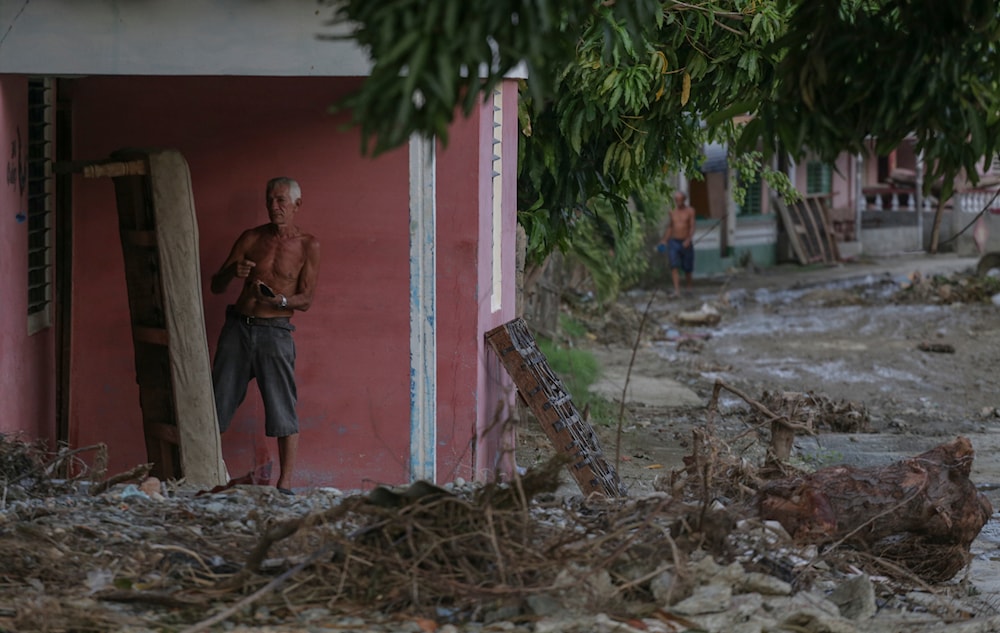After Hurricane Rafael, two earthquakes hit Cuba
Two strong earthquakes hit southern Cuba just days after a hurricane caused a nationwide power outage.
-

A local looks at a drying mattress after Hurricane Oscar hit the town of Imias in Guantanamo province, Cuba, on October 30, 2024 (AP)
Two strong earthquakes hit southern Cuba in quick succession on Sunday, according to US geologists, just days after the island was devastated by Hurricane Rafael, which knocked out power across the country.
The quakes caused cracks in walls and damaged homes, though initial reports suggest there were no fatalities. Many residents fled into the streets, visibly shaken by the tremors, coming so soon after the impact of Hurricane Rafael, a Category 3 storm that struck the island on Wednesday.
"It's the last thing we needed," Dalia Rodriguez, a housewife from the town of Bayama in southern Cuba, told AFP, adding that a wall of her house had been damaged.
Despite sanctions, Cuba has a long history of successful natural disaster preparation focused on avoiding any casualties. Hurricane Rafael has now passed through the country causing damage and blackouts, but no loss of life. pic.twitter.com/Bpro2tS4vN
— red. (@redstreamnet) November 8, 2024
The US Geological Survey reported that the second, stronger earthquake on Sunday had a magnitude of 6.8 and occurred at a depth of 14.6 miles (23.5 kilometers), about 25 miles off the coast of Bartolome Maso in southern Granma province. This followed a first tremor just an hour earlier, which was measured at a magnitude of 5.9.
The earthquakes are the latest in a series of crises for the island, which has already faced two hurricanes and two major blackouts in the past three weeks.
❗️🌀🇨🇺 - Hurricane Rafael has intensified to Category 3 as it approaches the west coast of Cuba, which is still struggling after a recent blackout and the impact of Hurricane Oscar.
— 🔥🗞The Informant (@theinformant_x) November 6, 2024
The US National Hurricane Center warned of the possibility of flooding, dangerous winds and… pic.twitter.com/V9jgQ3zLu3
On October 18, the island experienced a nationwide blackout after its largest power plant malfunctioned, followed by Hurricane Oscar just two days later. The aftermath of Hurricane Rafael last week has led to rare protests, with authorities reporting an unspecified number of arrests.
'People got scared'
The state-run newspaper, Granma, reported that, while no deaths were immediately confirmed from Sunday's earthquakes, the tremors were felt across eastern and central provinces of the Caribbean island.
"Here people quickly took to the streets because the ground moved very strongly," Andres Perez, a 65-year-old retiree who lives in downtown Santiago de Cuba, told AFP via telephone of the first quake.
"It felt very strong, really, my wife is a bundle of nerves," he added. "There are houses with cracked walls, others had walls falling down and some had their roofs collapsed," Karen Rodriguez, a 28-year-old hairdresser, told AFP from Caney de las Mercedes, a small town in Bartolome Maso.
The aftermath of a 6.8 magnitude earthquake in Cuba after weeks of hurricanes and blackouts. pic.twitter.com/SScQeLlKVJ
— Lucifer (@krishnakamal077) November 10, 2024
The US tsunami warning system confirmed that no tsunami alert was issued following the earthquakes. Meanwhile, Hurricane Rafael had left residents across Cuba without power for two days. Amid growing concerns over instability, President Miguel Diaz-Canel warned that his government would not tolerate efforts to "disturb public order."
Incredible. Hurricane #Rafael is now just the SECOND Major Hurricane ever recorded in the Gulf of Mexico in the month of November, joining Hurricane Kate from 1985. Re-attaining Category 3 intensity after making landfall in Cuba on Wednesday, Rafael has stunningly achieved 120… pic.twitter.com/qtrfdSYrz7
— Backpirch Weather (@BackpirchCrew) November 8, 2024
Local prosecutors reported on Saturday that an unspecified number of people had been arrested following protests in the aftermath of Hurricane Rafael.
The government announced that by Sunday, around 85% of the capital's residents had their power restored. However, the two hardest-hit provinces in the west, Artemisa and Pinar del Río, remained without electricity.

 3 Min Read
3 Min Read








